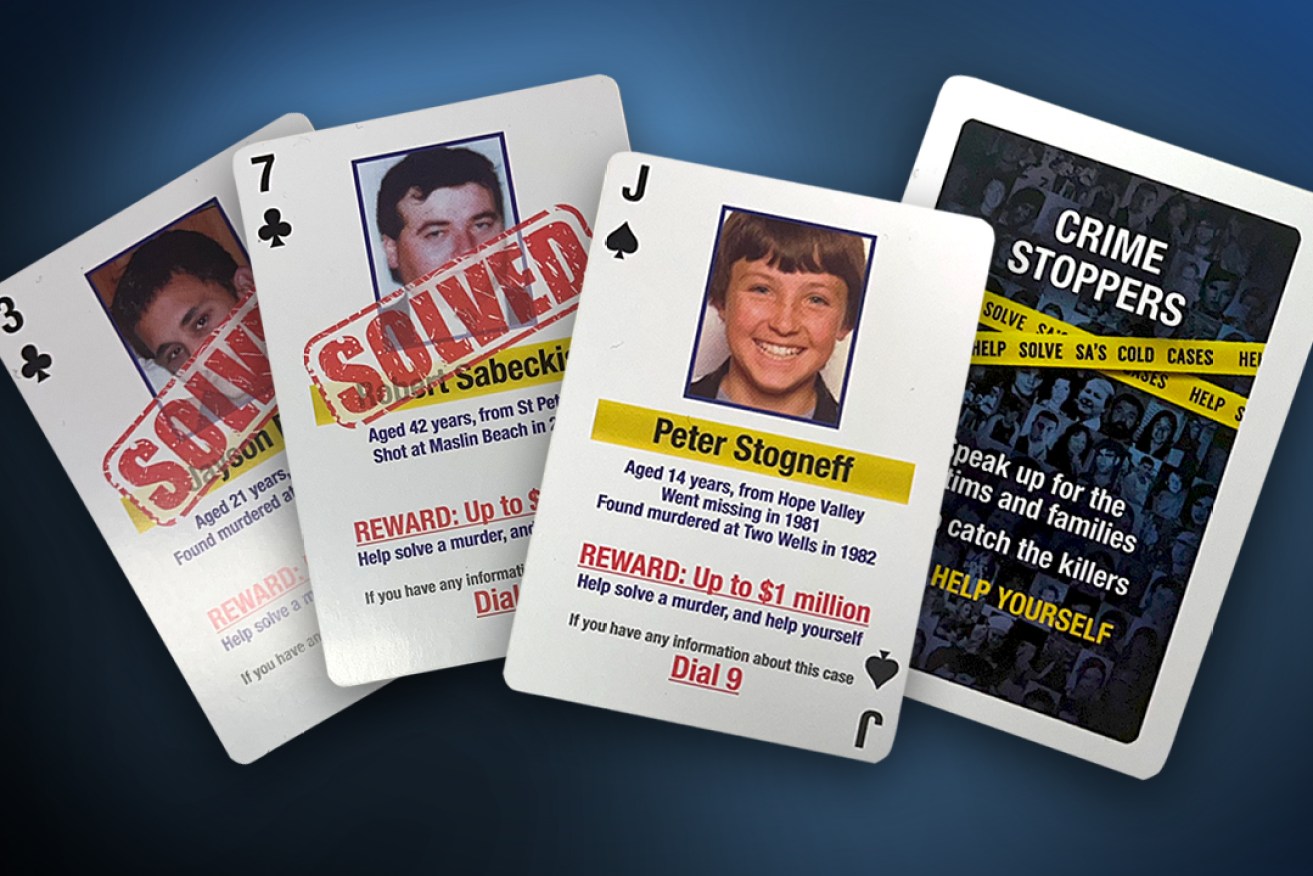Playing a part in solving SA cold case murders
A new deck of playing cards featuring unsolved murders will be given to prisoners as part of an ongoing police campaign – now attracting international interest – to try to crack some the state’s most baffling cold cases.


Some of the playing cards being distributed in SA prisons to help solve cold case murders. Image: Tom Aldahn/InDaily
In a nation first, packs of crime cards were first distributed in South Australian prisons in 2017, offering rewards and incentives to criminals in exchange for information to help solve murders and missing people cases.
The unusual strategy is part of Operation Persist, launched in 2015 to target prisoners for vital information.
Head of major crime detective superintendent Des Bray said that since then the operation had helped solve 10 cases, with 20 murder charges laid and three bodies recovered.
The cards have been updated – with some more recent unsolved murders – and will be distributed throughout the state’s prison system.
“There are over 6000 prisoners who pass through the correctional system each year and about 7000 in community corrections so all up that gives us about 13,000 opportunities to help solve our cold cases every year,” Bray said.
“The provision of information by people within the criminal community is instrumental to solving many major crimes across the state.”
Bray said that since Operation Persist began, police had had approaches from 121 prisoners, either directly themselves or through their lawyers, friends or family.
“That’s resulted in 174 pieces of actionable information where it’s created the opportunity for us to follow up and 36 of those prisoners have provided statements,” he said.
Bray said “cold cases are really difficult to solve” and while advances in forensic science had helped solve some, “it’s certainly not the answer in all cases”.
“Often we find that exhibits were collected at a time when the forensic science wasn’t as advanced or over the years exhibits have degraded and are no longer suitable,” he said.
“So then you come back to those tried and tested methods of investigation that have existed for hundreds of years and that is getting information from people within the criminal community to help solve cases.
“It will be that obtaining of information from the criminal community and people in prisons that will continue to help us solve cases.”
New South Wales recently followed South Australia’s lead and introduced a similar playing card strategy in prisons and Bray said detectives overseas were also now seeking information.
“We’ve had inquiries in the last few weeks from the UK who are considering a similar system,” he said.
“So it’s something that across the world everybody is keenly interested in.”
Bray said prisoners with information could ring a direct line and be put straight through to a cold case detective.
“Then we will put in place strategies to speak to that person in a safe way and get information from them,” he said.
Bray said the calls were not monitored by the Corrections Department so prisoners “don’t have to worry about somebody else listening in to their conversations”.
The cold case images on the cards are also being displayed on posters and television screens in prison waiting rooms.
“Some of the incentives on offer are substantial but I can say that there are quite a number of prisoners who’ve contacted us and provided information about murders, but they’ve wanted nothing in return because they saw it was the right thing to do,” he said.
“For those who do need incentives we have massive rewards on offer – up to $1 million and over $39 million in rewards in total.”
Bray said there was also the potential for prisoners to be re-sentenced for their crimes “and have a new court take into account cooperation they’ve provided”.
“In some cases we will consider immunity from prosecution for people not directly involved in the murder and we will always do what we can to keep those people who assist us to keep them safe both within the community and outside,” he said.
Crime Stoppers chief executive Nigel Smart said the playing card strategy was an “innovative” way of helping crack South Australia’s 118 unsolved cold cases.
“With this third tranche of playing cards throughout prisons if it leads to one or two cases being solved, bringing closure to those families is a great outcome,” he said.
Correctional Services Department chief executive Hayley Mills said: “The results to date clearly show that prisoners in our custody and offenders under our supervision do hold important information about these matters so we are very pleased to be able to continue to support and partner with Operation Persist.”




